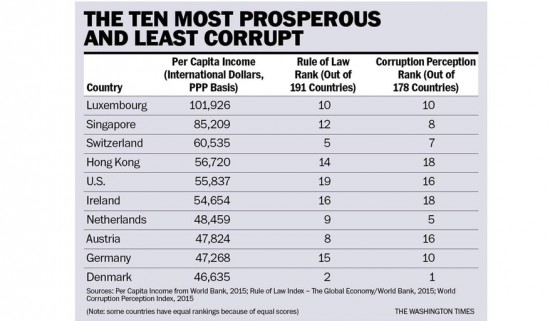Corruption and prosperity
What is the single most important determinate as to whether a country is rich or poor? It is not the level of government spending, taxation, regulation or monetary stability — even though those factors are very important. It is the rule of law, whereby the rules are known and fair, equally applied to all, and where corruption is not tolerated. The end of great countries and empires was most often caused by internal decay, not by foreign enemies — ancient Greece and Rome being prime examples.
The end of the Soviet Union and the communist countries in Eastern Europe had more to do with the pervasive corruption and lack of the rule of law within the regimes than external pressure. Prime Minister Margaret Thatcher, President Reagan and Pope John Paul II were able to topple the communist regimes largely with words because their foundations had become so rotten that the force of truth was enough to give the final push.
Highly corrupt countries are usually poor, and countries with the rule of law and low levels of corruption are usually relatively prosperous. The accompanying table lists the 10 richest countries in the world on a per-capita income basis. (Note: countries, such as Kuwait or Norway that have high per capita incomes because of oil and gas, and small, offshore financial centers, all of which lack broadly diversified economies, were not included). All of these listed countries also rank very high, being in the top 10 percent, when it comes to the rule of law and the lack of corruption. Scandinavian countries have higher incomes than would be expected, even though their governmental sectors and tax rates are well above the optimum; but this large disadvantage has been offset, in part, by the very low levels of corruption and strict adherence to the rule of law, without favoritism.
Disclaimer: All views, opinions and accounts included in the RAI News Section are those of the authors; their inclusion does not imply official endorsement or acceptance by RAI. The News Section reflects the selection of topics of informative value to the organization and its stakeholders. Its content is taken from press/media sources and does not in any way reflect official RAI Secretariat policy. RAI Secretariat is not responsible for possible inaccuracies in media reports.

